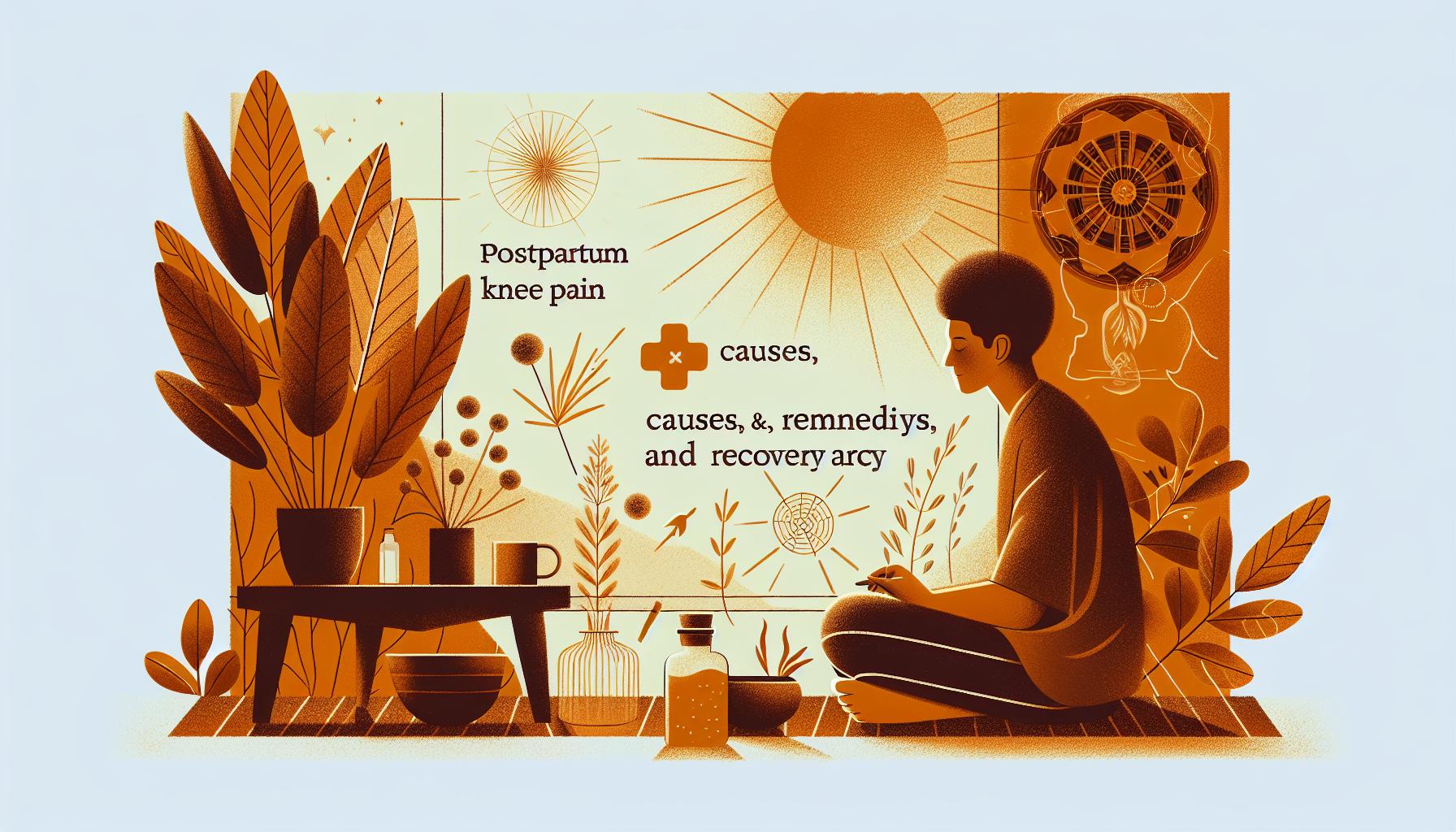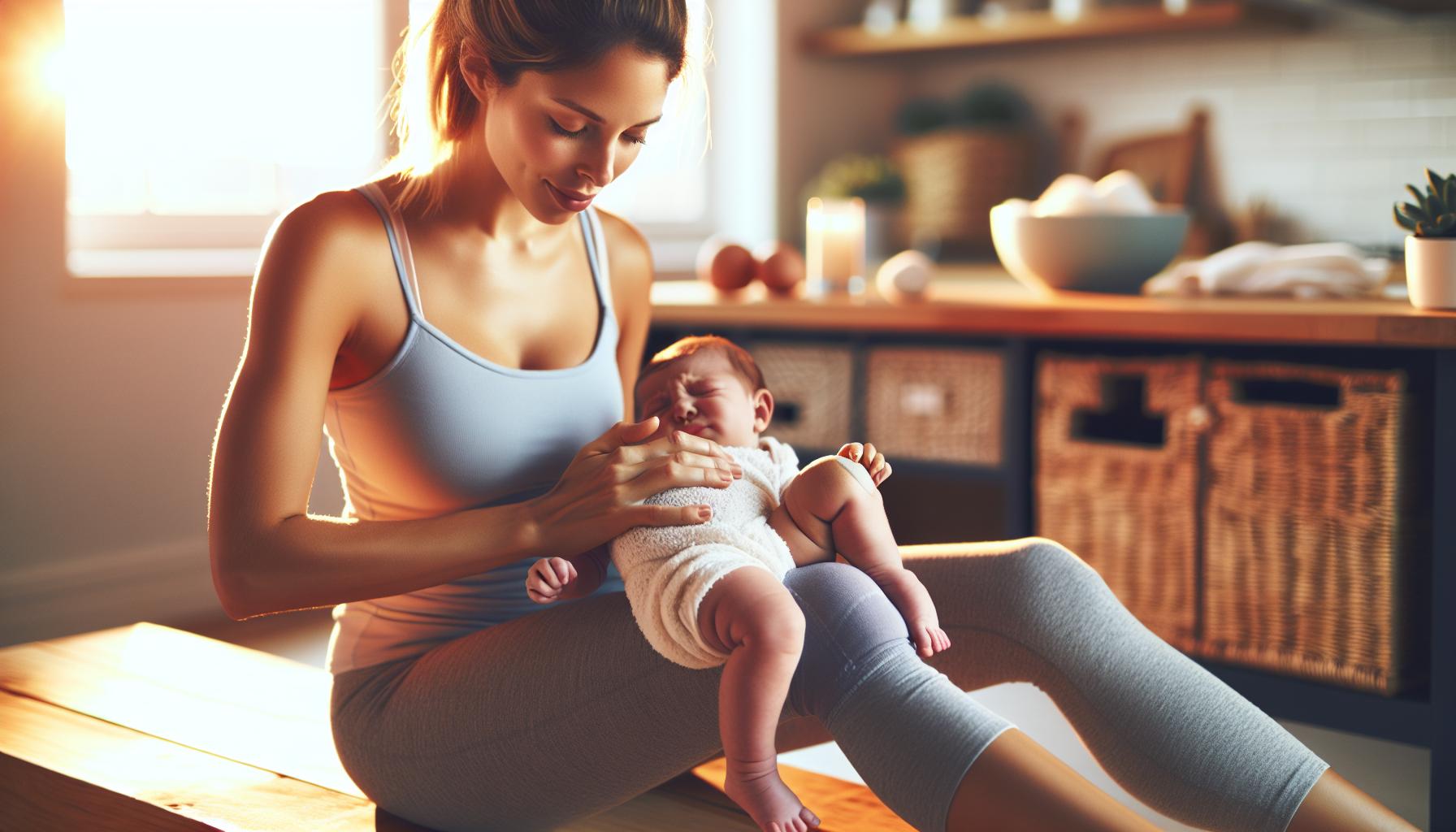Navigating new motherhood often comes with unexpected challenges, including persistent knee pain that can hinder your recovery.Understanding the root causes of postpartum knee discomfort is crucial for effective healing. In this article, you’ll discover practical remedies and recovery tips that can help restore your mobility and well-being, making this transition smoother and more enjoyable.
Understanding Postpartum Knee Pain: What to Expect After Birth
Postpartum Knee Pain: Causes, Remedies, and What to Expect
Experiencing knee pain after giving birth may not be the first thing on a new mother’s mind, but this issue can significantly impact mobility and daily activities. The life-altering transition into motherhood often involves various physical changes, and joint discomfort is one of its less talked about consequences. Understanding the nuances of postpartum knee pain can empower new moms to navigate their recovery effectively and reclaim their active lifestyle.
Several factors contribute to knee pain in the postpartum period. Hormonal shifts, particularly the increase in the hormone relaxin during pregnancy, allow for pelvic joints to become more flexible. While beneficial during labor and delivery, this heightened versatility can cause instability in other joints, including the knees. Additionally, the extra weight gained during pregnancy and the changes in posture while holding or nursing a baby can impose additional stress on the knees, leading to discomfort.
Common Causes of Postpartum Knee Pain
- Hormonal Changes: Increased levels of relaxin lead to joint laxity.
- Weight Gain: Extra weight can strain knee joints.
- Posture Changes: Altered body mechanics while caring for a newborn.
- Previous Injuries: Past knee injuries can resurface postpartum.
New mothers can take proactive steps to alleviate this discomfort. Engaging in gentle stretching or strengthening exercises can improve knee stability and flexibility. Low-impact activities, like swimming or walking, are excellent choices for strengthening the knee joint without exacerbating pain. It’s also advisable to consult with a physical therapist who specializes in postpartum recovery; they can offer tailored exercises that focus on the pelvic floor and core—vital areas that support overall body stability. For immediate relief, applying ice to the knee, using compression sleeves, or taking over-the-counter anti-inflammatory medications can help manage pain levels.
By recognizing the potential factors contributing to postpartum knee pain and implementing effective strategies for recovery, new mothers can ensure a smoother transition back to their active lifestyle while caring for their little ones.
Common Causes of Knee Discomfort in New Mothers
Knee discomfort is a common yet often overlooked issue for new mothers,especially in the wake of childbirth. During pregnancy and postpartum,various physical,hormonal,and lifestyle changes can converge,leading to discomfort that can affect daily activities. Understanding the underlying causes of knee pain can empower new mothers to seek effective remedies and improve their overall well-being.
Hormonal Changes
One of the most significant factors contributing to knee discomfort in postpartum women is the fluctuation of hormones. After giving birth, levels of the hormone relaxin, which helps soften and lengthen the cervix during pregnancy, can remain elevated for a time. This hormone can cause ligaments to become looser, which may lead to instability in the knee joint.as an inevitable result, activities as simple as walking or climbing stairs can become painful.
weight Fluctuation and muscle Weakness
Another major factor is the rapid weight changes that often accompany pregnancy and postpartum recovery. As new mothers carry additional weight during pregnancy, their bodies adapt by changing posture and muscle engagement, leading to potential imbalances. After childbirth, if they do not gradually regain muscle strength, weaknesses can linger, particularly in the quadriceps and hamstrings, resulting in increased stress on the knee joint.
Increased Physical Activity
For many new mothers, the transition to motherhood involves a sudden increase in physical activity—lifting, bending, and carrying a newborn can put strain on the knees. If one has not been active for a while during the later stages of pregnancy, this sudden uptick can lead to overuse injuries, such as patellar tendonitis or bursitis. Engaging in new physical activities without proper conditioning can amplify discomfort, making it essential for new mothers to ease into exercise routines carefully.
Common Contributing Factors
Several additional factors can exacerbate knee discomfort post childbirth:
- Improper Footwear: Wearing non-supportive shoes while carrying an infant can lead to poor alignment and further strain on the knees.
- Previous Injuries: Any prior knee injuries or conditions may resurface, adding to the discomfort during this challenging time.
- Joint Stress from Weight-Bearing Activities: Activities like squatting to pick up the baby can put a lot of pressure on the knees, especially if not done with proper technique.
While knee discomfort is common in the postpartum phase, understanding its causes can significantly aid in finding relief. Through appropriate rest, dietary adjustments for weight management, strengthening exercises for muscle support, and awareness of body mechanics during everyday tasks, new mothers can mitigate their knee pain effectively.
Practical Remedies to Alleviate Postpartum knee Pain
Did you know that nearly 80% of new mothers experience some form of pain during the postpartum period? Among these concerns, postpartum knee pain can be especially debilitating, impacting mobility and overall well-being. fortunately, there are practical remedies that can help alleviate this discomfort and promote faster recovery.
Gentle Stretching and Strengthening Exercises
Incorporating suitable exercises into your daily routine can play a crucial role in relieving knee pain. Focus on gentle stretching to improve flexibility and strengthen surrounding muscles, which provides better knee support. Here are some exercises you can consider:
- Quad Stretch: Stand on one leg and hold onto a stable surface for balance.Bend your other knee to bring your heel toward your buttocks and hold for 15-30 seconds.
- Hamstring Stretch: Sit with one leg extended and reach toward your toes, holding for 20-30 seconds. Switch legs and repeat.
- Straight Leg Raise: Lying on your back, keep one knee bent and slowly raise the other leg to the height of the bent knee. Hold briefly before lowering.
Cold and Heat Therapy
Alternating between cold and heat therapy can provide significant relief for postpartum knee pain. Start with ice packs, applying them to the affected area for 15-20 minutes to reduce swelling and numb pain. After a couple of days, switching to heat therapy can help relax and soothe tight muscles. Use a warm towel or heating pad, ensuring it’s comfortable but not too hot.
Supportive Measures
Wearing supportive gear can have a lasting impact on knee pain. Consider investing in knee braces or compression sleeves that promote stability and reduce strain. Additionally,paying attention to footwear can make a big difference. Opt for shoes with cushioned soles and adequate arch support to minimize stress on the knees during daily activities.
Table: Quick Reference for Remedies
| Remedy | Description | Tips |
|---|---|---|
| Stretching Exercises | Simple stretches to enhance flexibility. | Consistency is key; aim for daily practice. |
| cold Therapy | Ice packs to reduce swelling. | Use for 15-20 minutes every few hours. |
| Heat Therapy | Heating pads to relax muscles. | Apply after a few days of cold therapy. |
| Supportive Gear | knee braces and supportive footwear. | Choose items that fit comfortably. |
Every woman’s body reacts differently postpartum, and what works for one may not work for another. monitoring your pain levels and actively engaging in these tailored remedies can significantly support recovery. Always consult with a healthcare professional before starting any new treatment to ensure it’s safe for your particular situation.
Recovery Strategies: How to Support Your Healing Journey
When embarking on your healing journey after experiencing postpartum knee pain, a multifaceted approach is key to recovery. This often involves a blend of physical rehabilitation, lifestyle adjustments, and emotional support. By understanding effective recovery strategies, you can create a personalized plan that addresses both the physical discomfort and the psychological aspects of healing.
recognizing Your Body’s Needs
Before you jump into specific recovery methods, it’s crucial to listen to your body. Postpartum knee pain may stem from a variety of sources—including hormonal changes, increased physical activity, or the physical strain of motherhood. Acknowledge how your body feels each day and adjust your activities accordingly.
Start by incorporating gentle movements that promote circulation and flexibility.Activities like walking and stretching can be beneficial. Here’s a quick guide to exercises that may help alleviate knee pain:
- Gentle stretches: Focus on the quadriceps, hamstrings, and calves to improve flexibility.
- Low-impact exercises: Swimming or cycling can strengthen the muscles around the knee without undue stress.
- Resistance training: Gradually introduce weights to strengthen surrounding muscle groups, which supports the knee joint.
Nutrition and Hydration
Supporting your body from the inside is just as vital as physical activity. Proper nutrition plays a crucial role in recovery. Aim to consume a balanced diet filled with anti-inflammatory foods. Foods rich in omega-3 fatty acids, such as salmon and flaxseeds, help reduce joint inflammation. Incorporate plenty of fruits, vegetables, and whole grains to provide essential vitamins and minerals that support recovery.
Additionally, staying hydrated is vital. Joint lubrication relies on adequate fluid intake, so endeavor to drink sufficient water throughout the day. Target at least 8-10 glasses daily, more if you are active.
considering Professional Help
If your pain persists, consulting with a healthcare professional or a physical therapist can offer you tailored strategies for managing postpartum knee pain effectively. A physical therapist can help you learn the correct techniques for exercises and may suggest modalities like ultrasound therapy or electrical stimulation to assist in pain management.
Here is a simple table to summarize options for professional help:
| Professional | Role in Recovery |
|---|---|
| Physical Therapist | Designs customized exercise routines and offers pain relief techniques. |
| Chiropractor | Addresses alignment issues with adjustments, improving overall movement. |
| Doctor | Evaluates underlying conditions and may prescribe medication for severe pain. |
Mindfulness and Emotional Well-being
don’t overlook the power of your mindset during recovery. Practicing mindfulness can significantly reduce stress and pain perception. Techniques such as deep breathing, meditation, or yoga not only promote a sense of calm but also foster a deeper connection to your body, which is essential in navigating postpartum recovery.
Incorporate some or all these strategies as you move toward healing from postpartum knee pain. remember, progress may take time, but with persistence and the right support, you can reclaim your strength and mobility.
When to seek Professional Help for Knee Pain
Knee pain, especially postpartum, is a common issue many new mothers face as their bodies adjust following childbirth. While experiencing some discomfort is normal, certain signs indicate that it’s time to consult a healthcare professional. Knowing when to seek help can make a significant difference in managing postpartum knee pain effectively and ensuring a smooth recovery.
Signs You Shouldn’t Ignore
Recognizing the symptoms that warrant professional intervention can be crucial in preventing chronic issues. Consider seeking medical advice if you notice:
- Persistent Pain: If your knee pain lasts longer than a few weeks and doesn’t improve with home remedies, it’s time to consult a doctor.
- Swelling and Inflammation: significant swelling or tenderness in the knee joint is a signal that something may be wrong.
- limited Mobility: Difficulty bending or straightening your knee can indicate underlying problems that require attention.
- Clicking or Popping Sounds: If you hear unusual noises when moving your knee, it could suggest structural issues within the joint.
- Accompanying Symptoms: If you experience fever, redness, or excessive warmth around the knee, this could signify an infection or other serious conditions.
When to Consult a Specialist
If your pain is severe or accompanied by any of the aforementioned symptoms, seeking help from a specialist is advisable. Orthopedic surgeons or physiatrists can provide targeted assessments and create personalized recovery plans. A thorough examination could reveal issues like ligament injuries or cartilage damage, which may not improve without professional intervention.
Moreover, postpartum knee pain can sometimes be linked to conditions like patellofemoral pain syndrome or tendinitis. Consulting with a physical therapist can also be beneficial. They can develop a rehabilitation program tailored to your needs, focusing on strengthening exercises and proper body mechanics to alleviate pain and prevent future incidents.
Building Your Support Team
Remember that early intervention often leads to a quicker recovery. don’t hesitate to build a support team that may include:
| Professional | Role |
|---|---|
| Orthopedic Surgeon | Diagnoses injuries and prescribes surgical or non-surgical treatments. |
| Physical Therapist | Leads rehabilitation exercises to strengthen knee stability. |
| Chiropractor | Addresses alignment and structural issues related to knee pain. |
| Primary Care Physician | Provides referrals and manages overall health concerns. |
Being proactive about your postpartum knee pain, understanding when to seek professional help, and engaging the right support team can significantly enhance your journey to recovery.
The Role of Exercise in Postpartum Knee Health
Did you know that nearly one in three women experience joint pain after childbirth? Among these, postpartum knee pain is particularly common and can significantly affect mobility and overall quality of life. Whether the pain arises from hormonal changes, the physical stress of childbirth, or the demands of caring for a newborn, exercise plays a crucial role in managing and alleviating this discomfort. Embracing a tailored exercise regimen can not only support healing but also contribute to long-term knee health.
building Strength and Stability
One of the primary benefits of engaging in exercise after childbirth is its ability to enhance the strength and stability of the muscles surrounding the knee joint.Strengthening the quadriceps, hamstrings, and calf muscles can provide better support to the knee, reducing the strain placed on this sensitive area. Here are some effective exercises that new mothers can incorporate into their routines:
- Quadriceps Sets: Simply tighten the thigh muscle while sitting or lying down, holding for a few seconds, then release.
- Straight Leg Raises: Lie on your back,keep one leg bent,and slowly raise the other leg while ensuring the knee is straight.
- Heel Slides: While lying down, slide your heel toward your buttocks, bending your knee gently, then slide back out.
Improving Flexibility and Mobility
Along with strengthening exercises, incorporating flexibility and mobility routines can help alleviate tightness and discomfort in the knee joint. Stretching and gentle yoga can be particularly beneficial as they promote blood flow and improve overall joint health. Consider adding the following activities to your weekly plan:
- Hamstring Stretch: Sit on the floor with one leg extended and the other bent. Reach towards the toes of the extended leg for a gentle stretch.
- calf Stretch: Stand facing a wall and place one foot behind you. Keep the back knee straight and lean into the wall for a deeper stretch.
- Child’s Pose: A yoga pose that stretches the lower back and hips,providing relief to the knees while promoting relaxation.
Preventing Injury with Proper Techniques
As you transition back into regular exercise, focus on proper technique to prevent any unneeded strain on your knees. Here are a few guidelines to keep in mind:
- Warm-up: Always start with a 5-10 minute warm-up to prepare your muscles and joints.
- Gradual Progression: increase intensity and duration gradually; avoid high-impact activities until you feel strong.
- Listen to Your Body: Pay attention to how your body responds and adjust your exercises as necessary.
By participating in a consistent exercise routine tailored to your postpartum needs, you can greatly reduce the risk of chronic knee pain and foster long-term knee health. The journey to recovery may take time, but with dedication and physiological awareness, new mothers can reclaim their mobility and enhance their overall well-being.
Nutritional Tips for Supporting Joint Recovery
Did you know that what you eat can significantly impact your joint health? Nutrition plays a vital role in the body’s ability to heal, especially for new mothers experiencing knee pain due to the physical stresses of pregnancy and childbirth. By incorporating specific nutrients into your diet, you can aid your body’s recovery process and reduce inflammation associated with postpartum knee pain.
Key Nutrients for Joint Recovery
Focus on including a variety of the following nutrients that support joint health:
- Omega-3 Fatty Acids: Found in fatty fish like salmon and walnuts, these healthy fats reduce inflammation and promote joint mobility.
- Antioxidants: Foods rich in antioxidants, such as berries, leafy greens, and nuts, can definitely help combat oxidative stress and alleviate joint pain.
- Vitamin D: Essential for calcium absorption and bone health, vitamin D can be sourced from sunlight and fortified foods.
- Calcium: Critical for maintaining bone density, include dairy products or fortified plant-based milk in your diet.
- Collagen: Consuming bone broth or collagen supplements may support cartilage repair.
Foods to Include in Your Diet
here’s a practical table of foods that can be beneficial for joint recovery:
| Food | Nutrient | Benefit |
|---|---|---|
| Salmon | Omega-3 Fatty Acids | Reduces inflammation and promotes joint flexibility. |
| Berries | Antioxidants | Combat oxidative stress and reduce joint pain. |
| Spinach | Vitamins K and C | Supports bone health and contains anti-inflammatory properties. |
| almonds | Vitamin E | helps combat inflammation and support joint health. |
| Bone Broth | Collagen | Supports cartilage integrity and joint repair. |
Practical Tips for Implementation
To optimize recovery from postpartum knee pain,consider these actionable steps:
- Plan your meals around the nutrients listed,ensuring each meal contains a balance of proteins,healthy fats,and carbohydrates.
- Experiment with smoothies that combine leafy greens, berries, and almond milk for an antioxidant-rich boost.
- incorporate foods from the table into your weekly meal prep,making it easier to stick to a joint-friendly diet.
- Stay hydrated with plenty of water; dehydration can exacerbate joint discomfort.
Through a focus on nutrition specifically aimed at joint recovery, new mothers can take meaningful steps toward alleviating knee pain and enhancing their overall well-being during the postpartum period.
mental Well-being: Coping with Pain and Fatigue in Early Motherhood
Understanding the Impact of Early motherhood on Mental Health
Navigating motherhood is a beautiful yet challenging journey,especially in the early months when your body is recovering from childbirth. During this time, many women face a combination of physical discomfort, such as postpartum knee pain, and emotional challenges, including fatigue and stress. Recognizing these struggles is the first step to enhancing your mental well-being and forging a fulfilling experience in the early stages of motherhood.
Coping Strategies for Pain and Fatigue
Managing both physical pain and emotional fatigue can feel overwhelming. however, implementing a few practical strategies can significantly improve your quality of life:
- Prioritize Rest: Sleep might be fleeting in early motherhood, but carving out even short periods of rest can help restore your energy levels. Try to nap when your baby sleeps.
- Engage in Gentle Movement: Light exercises, such as walking or postpartum yoga, can aid in pain relief and boost endorphins, helping combat feelings of anxiety and sadness.
- Find Support Systems: Reach out to friends or family members. Sharing your experiences can alleviate emotional burden and foster connections that are vital for mental health.
- Practice Mindfulness: Techniques such as meditation or deep breathing exercises can help center your thoughts and manage stress levels, even when dealing with discomfort.
Building a Routine That Incorporates Self-Care
Establishing a daily routine that incorporates self-care is essential.It’s important to remember that caring for yourself is not a luxury but a necessity.Consider incorporating the following elements into your day-to-day life:
| self-Care Activity | Benefits |
|---|---|
| Hydration: Drink plenty of water. | Aids in recovery and energy levels. |
| Nutrition: Eat nourishing foods. | Supports healing and boosts mood. |
| Physical Activity: Gentle stretching or walks. | Reduces knee pain and improves mental health. |
| Social Connection: Schedule calls or visits. | Reduces feelings of isolation and enhances happiness. |
| Creative Expression: Journaling or crafting. | Provides a healthy outlet for emotions and stress relief. |
By focusing on these elements,you empower yourself to create a fulfilling daily routine that nurtures both your mental and physical health. The journey of early motherhood can be overwhelming, but with the right strategies, it’s possible to cope effectively with postpartum knee pain and fatigue, ultimately paving the way for a more positive maternal experience.
Concluding Remarks
Navigating postpartum knee pain can be a challenging experience, but understanding the causes and exploring effective remedies can pave the way for a smoother recovery. Remember, you’re not alone on this journey—many parents face similar hurdles, and it’s perfectly okay to seek support. Whether it’s strengthening exercises,gentle stretches,or simply giving yourself the grace to rest,every small step counts towards regaining your mobility and comfort.We encourage you to explore these strategies and consider speaking with a healthcare professional who can provide personalized guidance tailored to your unique needs. Your well-being is essential, not just for you, but for your family’s overall joy and harmony.Embrace this phase of recovery with patience and positivity—better days are ahead, and with the right knowledge and resources, you can navigate this path with confidence. Keep learning, stay connected, and always prioritize your health. You’ve got this!






